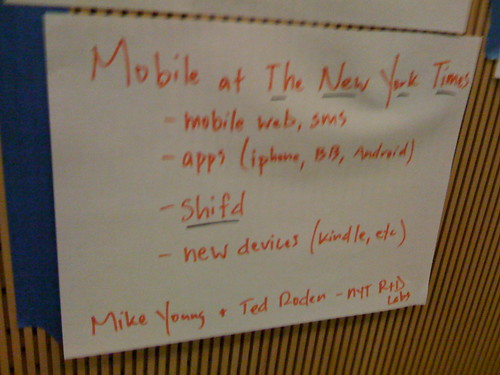
This weekend we attended mobileCampNYC3. A bit of a drive from Boston but boy was it worth it. about 200 peeps showed up. Mind u, these are peeps with real life, jobs and plenty of stuff to do in the w/e. Still they were there. Great to see Dave Harper (taking QR codes the next step), Raul from QTrax, Keith from PadPaw and many other great peeps.
for the most part, geeks are geeks. stick together and feed each other with ideas. So the outstanding session which made my day was by Mike Young and Ted Roden from "The New York Times Company" (what a name eh?).
Simply put, they presented NYT mobile strategy, composed of mobile web pages rendered in 5 different formats, mobile resident application strategy and mobile alerts. It was fascinating to finally listen to someone "from the outside" lay out how they see mobile. For example, I asked about their alerts. They totally see mobile, and alerts specifically, as a valuable service to keep subs happy and grab new ones, despite the cost, which they agree, is high. (BTW, they use mBlox).
Their conversion from a link inside an SMS 'Alert' to a mobile page view is above 40% !!!
In a few months they achieved a couple hundred mobile subs and millions of impressions a month. Not bad.
I'm still waiting to get the ppt from Mike and learn more from it.
Then they presented SHIFD. Shift content between your PC and your device. Read something on your PC, mark where you left off, continue reading on the subway. Not only is it a cool idea, they get to work on it in the NYT lab!
Alexander Besher also brought some 'outsider' spirit to the game. He's an author and he discovered Dave Harpers' QR linking technology, using it in his book "Mangaman". Interesting again.
Perhaps the other session to mention was the moaning in the US about SMS costs and who controls the market as a result (being, the operators, not the services or the marketers). We were examining new methods to deliver SMS-like alert experience without having the operators in the middle of it (cost & control). One idea is to be embedded inside an application. Perhaps unrealistic if you want to have your own (distribution, development,...) but what if you used Facebook alerts for that?? Right, not everyone has Facebook on their phone, but most of those who have mobile internet phones are anyway in the teens or are geeks, and they'd have Facebook installed?. Similarly, a comment was made by Nick Clarey (brilliant brit from Airsource) about using RIM's Blackberry messaging technology (mind you that presents a slight reach problem, now that RIM aren't even 1st in US shipments). It completely works around the carriers and operated by RIM. The interesting comment was: "if the operators can control SMS, could they not have the same control over application messages or RIM's solution?".
I suppose the answer is 'Yes they could'. But there you really go into a power game. No one would shut down RIM, as no one would shut down Facebook. But they could twist Facebook to better control services using their messages to connect to their audience.
Anyway, great day in the big apple. Boston should have one of those too!

 Linkedin/amirrozenberg
Linkedin/amirrozenberg Twitter/amir_rozenberg
Twitter/amir_rozenberg GMail/Amir Rozenberg
GMail/Amir Rozenberg Facebook/Amir Rozenberg
Facebook/Amir Rozenberg


No comments:
Post a Comment